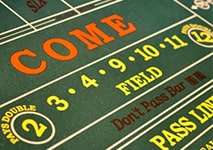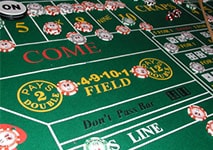The Field Bet
The Field Bet – How It Works and Should You Place It?
Craps offers an abundance of betting options, but not all wagers the game supports are created equal. Some bets give you better odds of winning than others, and, unfortunately, the subject of today’s article—the Field bet—does not belong to this category. Field bets are commonly placed by casual craps players, and their simplicity is the chief reason for their popularity. They are single-roll wagers that win when the shooter throws one of seven numbers and lose when the next dice toss produces one of four numbers.
On the surface, betting the Field seems like a good idea because there are more winning numbers than losing ones. The catch is that Field bets have a considerably higher house edge than other common wagers in craps. This article covers everything about Field bets—from how they work and how much they pay, to their odds of winning, along with their advantages and disadvantages. Also included is information on what strategy to use when betting the Field to increase your expected return in the long term.
-
 Sign Up Bonus
Sign Up Bonus
Up to $3500
350% Bonus!9.7 -
 Sign Up Bonus
Sign Up Bonus
Up to $500
400% Bonus!9.4 -
 Sign Up Bonus
Sign Up Bonus
Up to $2000
200% Bonus!9.3
The Field Bet Explained
 The Field bet is a single-roll wager that covers numbers 2, 3, 4, 9, 10, 11, and 12, all of which can be seen on the table layout in the Field betting section. Only four numbers, 5, 6, 7, and 8, can result in a loss, which makes betting the Field seem like a good idea. However, the four numbers that can cause you to lose account for 20 of the 36 possible dice combinations in craps. When you look at the odds from this perspective, you will quickly realize that the house has a greater advantage over players with Field bets.
The Field bet is a single-roll wager that covers numbers 2, 3, 4, 9, 10, 11, and 12, all of which can be seen on the table layout in the Field betting section. Only four numbers, 5, 6, 7, and 8, can result in a loss, which makes betting the Field seem like a good idea. However, the four numbers that can cause you to lose account for 20 of the 36 possible dice combinations in craps. When you look at the odds from this perspective, you will quickly realize that the house has a greater advantage over players with Field bets.
There is no need to memorize all winning Field numbers as they are always displayed on the table layout in the Field area. It is possible to encounter tables where 5 counts as a winning number while 9 results in a loss. These discrepancies in the rules have no impact on your odds as 5 and 9 both have four possible combinations each. As a result, this change neither increases nor decreases your chances of collecting payouts from your Field bets.
For example, imagine a player who approaches the craps table at the start of a new round and places a $5 chip in the Field section. The come-out roll produces a 7, and all Pass Line bettors at the table start cheering. However, the person betting the Field has no reason to rejoice, as their bet loses to a 7.
When you make a Field bet, it is important to follow the game and remember that you can place or remove your chips at any time. If you get distracted, however, your winnings and initial bet can easily be accepted as a parlay until you lose the Field bet.
Odds and Payout Options of the Field Bet
As mentioned earlier, players often enjoy placing bets on the Field because they believe they have an advantage since there are more winning than losing numbers for this type of wager. However, 5, 6, 7, and 8 can result from 20 of the 36 possible dice combinations in craps. By comparison, only 16 combinations result in a win with a Field bet. This gives the house a greater advantage and significantly reduces your odds of winning.
As we said earlier, when it comes to determining whether a bet is advantageous, we should consider both its payout and house edge. There are three different payouts for Field bets.
Players always receive even money if the dice roll produces 3, 4, 9, 10, or 11. Different payout structures apply when the dice show 2 or 12. The first option awards players who have made a Field bet a double payout (2 to 1) if either 2 or 12 are rolled. The second variant of craps pays 2 to 1 when the dice roll a 2, while the payout for a 12 is 3 to 1. The third and rarest case is when players are paid triple for either a 2 or a 12. The third payout option is also known as “zero expectation” because the casino has no advantage.
Field bets should be avoided unless you find a table that offers a 3 to 1 payout for either 2 or 12, or, even better, 3 to 1 for both numbers. As good as those payouts sound, the majority of casinos utilize the first payout structure for Field wagers.
Offering different payouts also affects the house edge of this bet. With the first payout structure, the house advantage is estimated at 5.56%. The great thing about tables that pay 2 to 1 for a 2 and 3 to 1 for 12 is that the house edge drops to 2.78%, which is considerably better for players. Keep in mind that even if the payout is tweaked the other way around (3 to 1 for a 2 and 2 to 1 for a 12), the casino advantage still remains 2.78%. As mentioned earlier, the third option of a 3 to 1 payout for both 2 and 12 is the best, as it gives the casino no advantage whatsoever.
Attractive Points of the Field Bet
 Craps offers some of the best as well as some of the worst possible casino bets. Field bets generally belong to the second category, although there are exceptions.
Craps offers some of the best as well as some of the worst possible casino bets. Field bets generally belong to the second category, although there are exceptions.
Despite the fact that the winning numbers covered by the Field outnumber the losing ones, the odds are still in favor of the casino. This is due to the fact that the combinations not included in the Field are 20, while those covered by the Field are only 16. You may be wondering why players would then choose to risk their money on this bet. The simple answer is they are simply unaware of their winning chances.
Even though most casinos will offer a payout of 2 to 1 for numbers 2 and 12, there are some craps tables that pay triple the original bet for rolling a 2. You may even encounter games that offer payouts of 3 to 1 for throwing a 12. This cuts the house edge almost in half, to 2.78%, which is better and may incentivize more players to bet on the Field. After all, a house edge of 2.78% is much better than the casino advantage yielded by some of the other single-roll bets in craps.
For those who prefer fast-paced games, betting the Field is a great option since the outcome of this wager is determined in a single roll of the dice. It may be a risky bet, but fans of thrilling casino games will definitely appreciate this betting option in craps.
Is the Field Bet an Option You Should Bet on?
Even though there are some attractive aspects of betting on the Field, you may still be uncertain whether this is a good wager to make in craps. The truth is it all depends on your playing style and whether you are looking for the lowest possible house edges. If your goal is to make bets that give the casino the least advantage, the Field bet is perhaps not for you.
Even though Field wagers are great for players enjoying the thrill of fast-paced action, most smart gamblers prefer to play while enjoying better chances of pocketing higher payouts. If you are playing a craps variation that offers Field payouts of 2 to 1 for rolling 2 or 12, the house edge you are combating is 5.56%. This is definitely not a profitable bet, and you have much better chances to rack up great payouts if you stick to the Pass Line/Don’t Pass and Come/Don’t Come wagers, especially if you take or lay free odds on them.
Betting on the Field is considered bad because the dice combinations outside the Field outnumber those that result in a win. Let us look at the Field numbers first. There is only one combination for 2 and 12, so the payout for these two numbers is higher than the even money awarded for the other Field numbers. The dice can roll 3 or 11 in two ways, while 4 and 10 can be made in three ways each. Lastly, there are four dice combinations of 9. If you combine all these dice combinations, you will get 16 ways to win a Field bet. This does not sound so bad until you realize there are 36 combinations in total in the game of craps. Thus, the remaining 20 combinations are outside the Field and are reserved for the four ways to get a 5; five combinations can produce 6 or 8, and six combinations result in a roll of 7.
Inexperienced players might be fooled by the higher number of winning numbers and make a Field bet. In reality, the losing combinations outnumber those that cause you to win with this wager. This is why it is recommended that you do not place this bet. Even with the double payout for 2 or 12, players cannot overcome the disadvantage of betting on only 16 possible winning combinations.
You can make a Field bet occasionally, but be careful not to overdo it. As a single-roll bet, it may award fast payouts to lucky players, but its odds are definitely not in your favor. Even with a payout of 3 to 1 for one of the two least probable numbers (2 and 12), the Field bet is still considered an unsuitable option for players looking for low house edges.
Field Bet Craps Strategy
Although Field wagers are not among the best bets you can make in craps, there are several strategies that may actually boost your bankroll when betting on this specific option. We will show you two tactics that can definitely give you a greater advantage when you are making Field bets.
The first strategy is known in the craps community as the Iron Cross Craps System. It is fairly easy to master but may require some getting used to. You may also encounter this system under a different name, the No Seven System. This is due to the fact that players who utilize this strategy cover all numbers except the 7. As you should already know, players who bet on the Pass Line are hoping for a 7 on the come-out roll. Since this is usually the bet that most craps players place, you may want to wait so that you are not playing against most gamblers at the table. The Iron Cross system is normally used only after the shooter establishes a point for the Pass Line. When the timing is right, you simply put chips in the Field section of the layout, as well as on numbers 5, 6, and 8. This way, you will cover all possible numbers except 7.
If you are just starting to use this strategy, we recommend you begin with small stakes. Let us assume that you are betting $10 on the Field. As you should already know, Place bets are those made on specific numbers. In this case, we will presume that you are placing $10 on 5, $12 on 6, and $12 on 8. You place your Field bet yourself and instruct the dealer to cover the 5, 6, and 8 with $34 in chips on your behalf.
If your Field bet wins, you will win $10 for 3, 4, 9, 10, or 11, while 2 and 12 will reward you with $20, or even $30 in craps games that pay 3 to 1 for 2 (or for 12). Meanwhile, your Place bets will remain in action. On the other hand, if the dice roll either 5, 6, or 8, you will win $14 and lose your $10 Field bet. This is why you should replace it with another $10 from your winnings and continue playing the system.
Colonel would wait for three non-field numbers to roll before he started applying his system. He would then use the well-known Martingale method of doubling his Field bets until he either won the bet or gave up the game.
If you want to try this strategy, you can place $5 on the Field after you witness three rolls of non-field numbers. If you lose the Field bet, you should double your wager and bet $10 on the Field. If the upcoming dice rolls also produce non-field numbers, you should continue raising your stake until you either win the bet or can no longer afford to increase it. If you are lucky enough, you may double or even triple your stake and enjoy a fruitful craps session.


